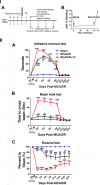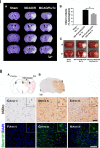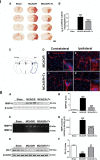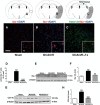Human neural stem cells rapidly ameliorate symptomatic inflammation in early-stage ischemic-reperfusion cerebral injury
- PMID: 25418536
- PMCID: PMC4445985
- DOI: 10.1186/scrt519
Human neural stem cells rapidly ameliorate symptomatic inflammation in early-stage ischemic-reperfusion cerebral injury
Abstract
Introduction: Clinically, a good deal of injury from stroke results from ischemic-reperfusion. There is a loss of cerebral parenchyma and its associated cells, disruption of neuronal connections, compromise of the blood-brain barrier, and inflammation. We tested whether exogenously engrafted human neural stem cells could migrate rapidly and extensively to damaged regions, following transplantation into a neurogenic site where migration cues are already underway during stroke onset, then counteract a number of these pathological processes.
Methods: One day post-injury, we injected human neural stem cells (hNSCs) into the ipsilesional hippocampus of a mouse model of stroke with middle cerebral artery occlusion to induce focal ischemia followed by reperfusion (MCAO/R). The time frame for hNSC transplantation corresponded to upregulation of endogenous proinflammatory cytokines. We examined the effect of hNSC transplantation on pathological processes and behavioral dysfunction 48 hours post-injury.
Results: Twenty-four hours after transplantation, engrafted hNSCs had migrated extensively to the lesion, and infarct volume was reduced relative to MCAO/R controls. The behavioral deficits seen in MCAO/R controls were also significantly improved. Given this rapid response, we hypothesized that the mechanisms underlying therapeutic activity were anti-inflammatory rather than due to cell replacement. In support of this idea, in hNSC-transplanted mice we observed reduced microglial activation, decreased expression of proinflammatory factors (tumor necrosis factor-α, interleukin (IL)-6, IL-1β, monocyte chemotactic protein-1, macrophage inflammatory protein-1α) and adhesion molecules (intercellular adhesion molecule-1, vascular cell adhesion molecule-1), and amelioration of blood-brain barrier damage.
Conclusions: While long-term effects of engrafted hNSCs on the amelioration of ischemic stroke-induced behavioral dysfunction in a rodent model have been reported, our study is the first to show rapid, beneficial impacts on behavioral function (within 24 hours) upon early delivery of hNSCs into the hippocampus.
Figures






References
-
- Lee JP, Jeyakumar M, Gonzalez R, Takahashi H, Lee PJ, Baek RC, Clark D, Rose H, Fu G, Clarke J, McKercher S, Meerloo J, Muller FJ, Park KI, Butters TD, Dwek RA, Schwartz P, Tong G, Wenger D, Lipton SA, Seyfried TN, Platt FM, Snyder EY. Stem cells act through multiple mechanisms to benefit mice with neurodegenerative metabolic disease. Nat Med. 2007;13:439–447. doi: 10.1038/nm1548. - DOI - PubMed
-
- Jeyakumar M, Lee JP, Sibson NR, Lowe JP, Stuckey DJ, Tester K, Fu G, Newlin R, Smith DA, Snyder EY, Platt FM. Neural stem cell transplantation benefits a monogenic neurometabolic disorder during the symptomatic phase of disease. Stem Cells. 2009;27:2362–2370. doi: 10.1002/stem.163. - DOI - PMC - PubMed
Publication types
MeSH terms
Substances
LinkOut - more resources
Full Text Sources
Other Literature Sources
Research Materials

